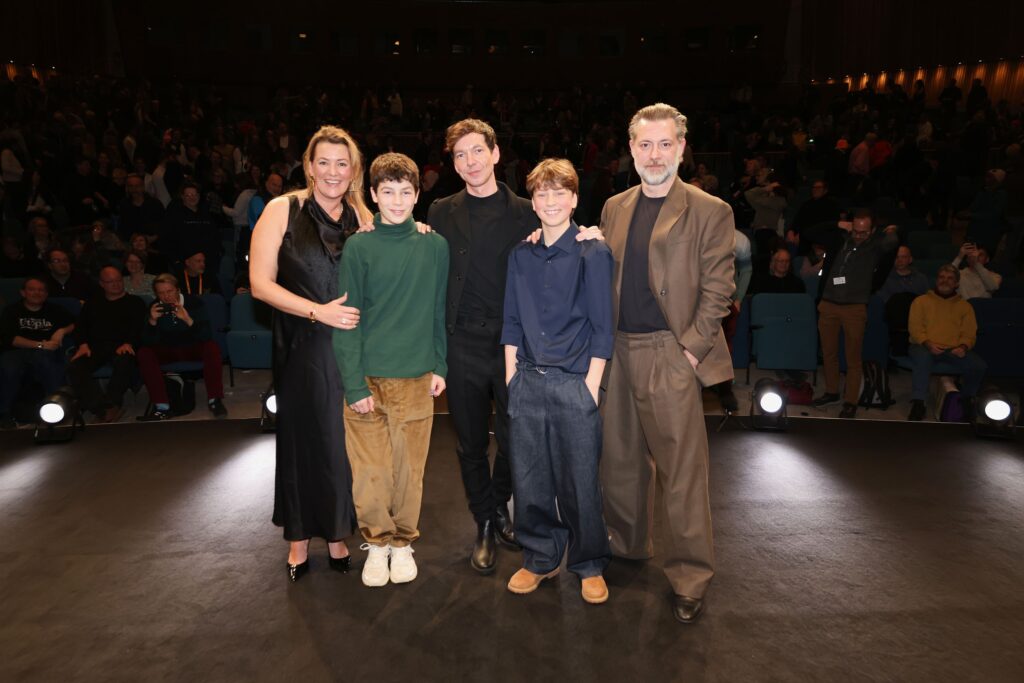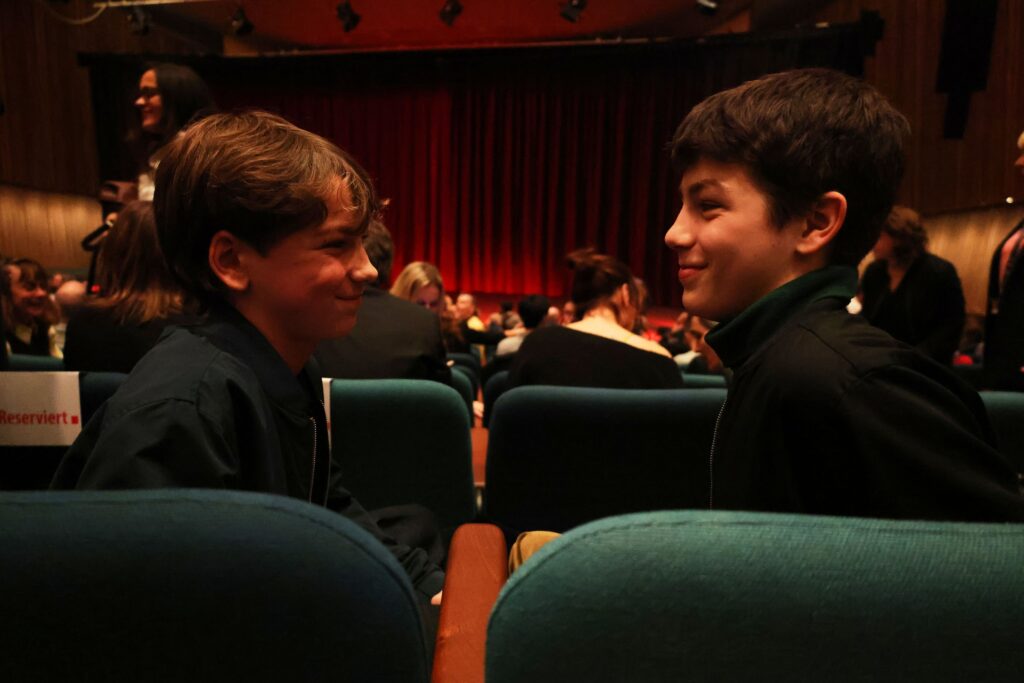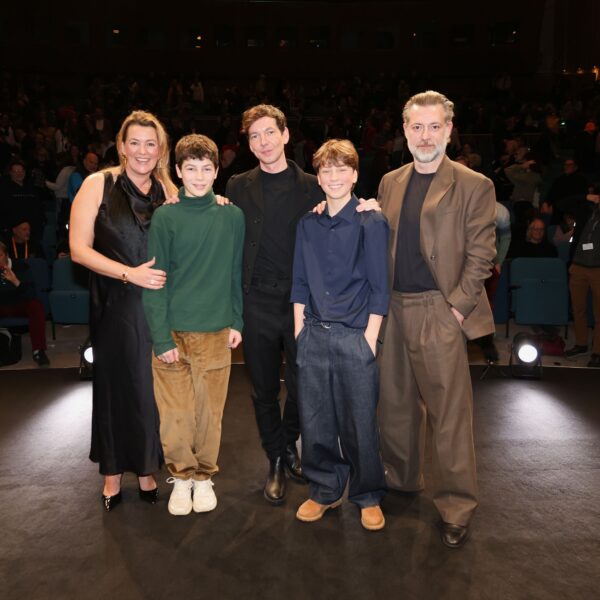After an incredible premiere of Young Hearts by Anthony Schatteman I can’t help but want to speak to Anthony about his debut feature film. We meet at Berlinale Palast for an interview about Young Hearts and his experience at Berlinale so far.
fGR: You’ve lived in Berlin before, but this is your first time at Berlinale presenting your own film. Do you have a favourite interaction so far or did you experience something particularly surprising?
Anthony Schatteman: Today we showed the film to a very young audience for the first time. At the premiere on Saturday we had a few kids, but today it was a room full of schools. That scared me a bit, but the response was really good. At first I thought that maybe the children just like to clap, but during the Q&A so many of them came to the mic and thanked me for the movie. One boy even said he felt the same as Elias and daring to say this in front of a thousand kids of all different cultures… It made me cry and I was a little overwhelmed. One woman came up to me afterwards and told me she could feel the shift throughout the movie. At the first kiss the audience were typical kids and just thought kissing was a little cringe. But for the final kiss everybody was cheering and clapping. She said the movie completely shifted their perception and emotions. I had hoped that after seeing the film some could relate to it and maybe have the courage to talk about it, but that was incredible.

Emilie De Roo, Marius De Saeger, Anthony Schatteman, Lou Goossens, Geert Van Rampelberg at the premiere of Young Hearts
fGR: It also isn’t common for the applause to carry on throughout the whole credits like it did on Saturday.
AS: That was a really scary screening. It was the first time showing this film to my family and the characters are very much based on them, so I was really nervous for their reaction. I was only thinking about them. My father kept wondering if he was going to come out good here, like this would be my revenge or something. So I said: „Wait until the end“.
They were so emotional. We had a photographer with us and he captured the moment when I hugged my mom and my father after the screening. We will never have this moment again. Also the hugs with my brother. It says everything we didn’t say for the last 24 years.
Sometimes I was looking at my brother and he was crying. He is a very „manly man“ who never shows his emotions. But he was crying and it did so much to me. He denied it after the screening. But he told my friends that maybe he has to show his emotions more.
It’s so crazy that this movie could do this to people. It’s just my own simple story that I thought people didn’t need or like, but now everywhere I hear and see that the urge of this story is so big.
fGR: Young Hearts is inspired by your own experience. What gave you the courage to tell your own story, or at least parts of it?
AS: I couldn’t have done this 10 years ago. I made a short film about the same topic (Kiss Me Softly, 2012), but that was more revenge. The father in the short film doesn’t come off well. Making the short film I knew I had to let him read the script because he was more famous back then than now. I knew the press was going to jump on it, even though it was just a short film. But we didn’t have a good relationship then at all. I was 22, I had just told him a year before that I was gay. But my teachers told me I had to let him read the script. So I did and he read the script and he was crying because it’s quite heavy, this short film. But afterwards he told me that I really have to tell our story. There was a lot of music in that film and I asked him to help with that. Even with that short film my family became so much closer.
But now of course with the movie that’s been shot in the street where I grew up, in my own school, in the streets where my dad, too, used to bike to school because it’s also where he grew up – it’s really a family movie. It’s not just about me, about Elias, but it’s also about the other generations and characters who all have to deal with this topic. Because you always think you’re alone growing up and having these difficulties, but my brother also had conversations with his friends about my sexuality, probably. Maybe he even got bullied because I was gay. I had to realize this by growing up and seeing my family more. And I realized that my family is very important and that’s why I told the story in this kind of way.
fGR: How was shooting for you, then? Emotionally challenging? Healing? A mix of both?
AS: Everyone told me to please enjoy it as well, don’t think too much of the result. But of course it was like one big therapy session for me – in a good way. Everything turned out even better than I had hoped because I found these two actors. They are the most talented people I have ever met. It’s so cool that they created their own characters from the script.
Of course, it was really stressful. Every first feature film is stressful, every film, even a short film. Every evening I was looking at the raw shots and every morning I tried to already edit some scenes just to make sure we had everything. Because these boys age so fast. We couldn’t do a reshoot, they already look so different now compared to the shooting.
I stayed for months in the village I grew up in, I slept in my own room at home. I knew everyone. My father was always there, my brother, my mom. Everyone felt a lot of love on set. I was stressed out, but it was really nice to see everyone so involved in the story and the characters. And the two boys really wanted to be the face of this story and that is so mature to say at 13 years old.
It was a truly wonderful period and I wish I could do this again just to be more relaxed and enjoy it more. But everyone else enjoyed it and kept telling me that I looked so happy – and I was.

Lou Goossens and Marius De Saeger at the premiere
fGR: How much of yourself do you see in Elias? Was it hard to find someone to portray your own story?
AS: We saw 1,500 boys, so it was quite intense. For Alexander, I knew from the beginning it was going to be Marius. And then for Lou it took a bit longer because I had to look for a young version of myself. But I think he’s more beautiful than I was. *laughs*
Jokes aside, I had to find some things that I could relate to. I had to make this click that reality was not the fiction I wanted to make.
In the beginning I didn’t tell the boys that the story was about me, so they were just themselves. Lou came in and was very sure of himself, he even auditioned for Alexander and was this rough guy breaking into an abandoned house. But I saw that inside, behind this mask, there was a very emotional boy that I could relate to. I remember pretending, as a teen, to be more masculine than I was, just to hide who I was inside.
Lou knows he’s into girls, but that wasn’t a topic for me at all. I just wanted them to understand the emotions that I wanted to make a movie about. And we talked a lot about emotions and what we are afraid of and what love is for us.
Talking about these emotions, I was always surrounded by my best friend who is a child psychologist and therapist as well. He has known me since I was young, so he really knew what I wanted to make and who I needed to find. But we had to make sure that these boys could ask any questions they had about sexuality. For example, it was really intense for them to kiss because they had never even kissed a girl. Luckily they became best friends from the moment of the casting and in the end the kiss was just a technical thing.
And casting the two of them was the best decision of my life.
If you remember the car scene – I thought my therapy session was done in the writing. But the day we were shooting this scene it was at the end of the day, my ex came visiting, there was a lot going on at once. We didn’t rehearse that scene. I just wanted to start with a close-up on Lou, I did’t give him many directions. Then he started crying and I died inside. He did it in one take, this shot. It was amazing. That’s when I knew this could be something.
fGR: What is something you would like to see more of in cinema, both queer and non-queer related?
AS: Of course I want more representation. I think it’s better than even 20 years ago, but still there’s this box LGBTQ movies are put in.
I hope stories in the end won’t be about whether it’s a gay movie. That people will just say, „this is a movie about love“. Of course, we’re not there yet, but I think if we have these stories, it will be just normal that we randomly see a story about two gay characters, but in the end it doesn’t matter anymore.
If you look at something like Heartstopper for example. So many young girls around age 12 are into it because it’s just a series about love and being in a happy school and environment. Heartstopper is such a good example of things we need in life.
fGR: I love Heartstopper and I think Young Hearts can definitely compare!
AS: I hope so! It’s a big ladder we have to climb up. But I’m already happy with it. Just meeting this young little kid at the screening who was telling me „thank you for this movie, I loved it“ – he made me realise he was the reason that I made this movie. That he dared to say in front of his classmates and everyone else in the room that he’s like my main character. I would have never dared to do that.
And I always thought my movie was just important for people like us who are queer and who need these stories. But a few years ago some kids around age 17 downloaded Grindr and they invited a gay guy into a park and killed him there. There are people from different cultures and homosexuality is just something they don’t talk about. So I think my movie is also important for people who never are confronted with gays in their family or environment. It’s important for them to see these stories. I really hope that a lot of schools will make sure that this movie is seen in their classes and in schools and to show everyone that this is just a normality.
fGR: That taps into my last question – what are your hopes for Young Hearts going forward?
AS: I just really hope that everyone who wants to see the movie will be able to see the movie. Some kids won’t dare to ask their parents to go watch it because they’re afraid of their reaction. My parents waited for me to reach out to them. But I hope that my film can tell parents to reach out to their kids and not wait until they feel they have the courage to say it. Because I only had the courage when it was quite late. I think you really have to reach out to your children and make sure they feel safe to talk about these emotions. And I hope my film will be on a platform like Netflix where it’s easily available.
We continue talking for a bit about the next steps and the Teddy Awards that Young Hearts is nominated for before Anthony has to join the next interview. I can only wish him and his debut feature the best of luck in conquering the cinemas and eventually streaming services. A review to the film can be found here.

